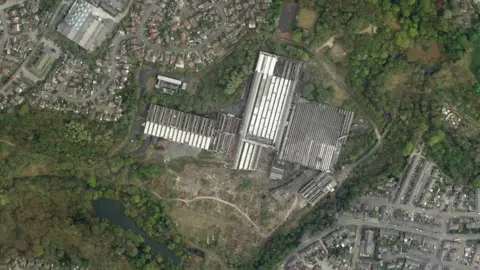Asbestos: Site of world's largest factory to be cleaned up, new owners say
 BECG
BECGThe former home of the world's largest asbestos factory is to be cleaned up by its new owners, it has been revealed.
The land in Rochdale, which housed Turner Brothers Asbestos, has been bought by ESG Trading, the Local Democracy Reporting Service said.
ESG chairman Martin Greenwood said it would "decontaminate, demolish and remediate" the 111-acre site before putting forward any proposals for it.
Councillor John Blundell said it "must be safe" before plans were considered.
The Labour cabinet member for economy said there was "lots of different opinions" for the Spotland site, but "ultimately it needs to be driven by people that know what they are talking about remediating asbestos".
Plans to build 600 homes on the land were thrown out by Rochdale Council in 2011, following a six-year battle by campaigners who feared people's health could be put at risk.
Safety 'first priority'
A number of local residents, including Green Party campaigner Mick Coats, have previously called for the site to be turned into a country park.
Mr Coats said that was still the preferred option "because that would benefit more residents and... we really don't believe you could remediate it [as] you would have to spend millions".
Conservative councillor Peter Winkler said the "signs were good" for the site, given ESG's commitment "to engage with the council, the Environment Agency and the public".

The rise and fall of Rochdale asbestos
- Turner Brothers Asbestos - later Turner and Newall - was the world's largest asbestos company and owned mines in Canada and southern Africa alongside its factories in the north of England, where the mineral was processed into a spun yarn
- The dangers of the mineral were unknown when it first opened in the mid-Victorian era, but in 1924, employee Nellie Kershaw became the first person in the UK to be found to have died of asbestosis
- Her death led to the Asbestos Industry Regulations 1931, the world's first laws relating to the mineral
- Most asbestos materials were banned in the UK in 1985, with a complete ban following 14 years later
- The firm went out of business in 1998

Mr Greenwood said the land "provides a potential opportunity to contribute to the future growth of Rochdale" but needed "a careful, considered and safe strategy to decontaminate, demolish and remediate".
"I am very aware of the sensitivities that have surrounded previous attempts to regenerate the site and my team are in ongoing discussions... to develop a remediation strategy that exceeds statutory requirements," he added.
Mr Blundell said the council "takes very seriously what goes on that site as the planning authority".
"Before anything is done.... whether it's a country park or land for housing, the site must be safe," he said, adding: "Whatever happens, the safety of the public will be the first priority."

Why not follow BBC North West on Facebook, Twitter and Instagram? You can also send story ideas to [email protected]
